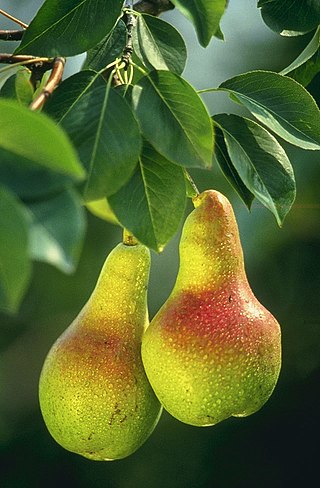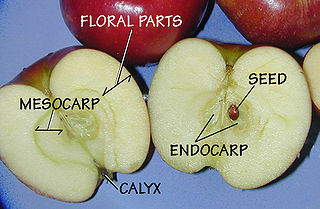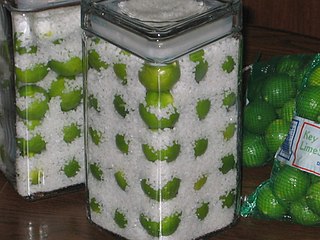
Pears are fruits produced and consumed around the world, growing on a tree and harvested in late summer into mid-autumn. The pear tree and shrub are a species of genus Pyrus, in the family Rosaceae, bearing the pomaceous fruit of the same name. Several species of pears are valued for their edible fruit and juices, while others are cultivated as trees.

A fruit tree is a tree which bears fruit that is consumed or used by animals and humans — all trees that are flowering plants produce fruit, which are the ripened ovaries of flowers containing one or more seeds. In horticultural usage, the term "fruit tree" is limited to those that provide fruit for human food. Types of fruits are described and defined elsewhere, but would include "fruit" in a culinary sense, as well as some nut-bearing trees, such as walnuts.
Perry or pear cider is an alcoholic beverage made from fermented pears, traditionally in England, particularly Gloucestershire, Herefordshire, and Worcestershire, parts of South Wales and France, especially Normandy and Anjou, Canada, Australia and New Zealand.

An orchard is an intentional plantation of trees or shrubs that is maintained for food production. Orchards comprise fruit- or nut-producing trees that are generally grown for commercial production. Orchards are also sometimes a feature of large gardens, where they serve an aesthetic as well as a productive purpose. A fruit garden is generally synonymous with an orchard, although it is set on a smaller, non-commercial scale and may emphasize berry shrubs in preference to fruit trees. Most temperate-zone orchards are laid out in a regular grid, with a grazed or mown grass or bare soil base that makes maintenance and fruit gathering easy.

In botany, a pome is a type of fruit produced by flowering plants in the subtribe Malinae of the family Rosaceae. Pome fruits consist of a central "core" containing multiple small seeds, which is enveloped by a tough membrane and surrounded by an edible layer of flesh. Pome fruit trees are deciduous, and undergo a dormant winter period that requires cold temperatures to break dormancy in spring. Well-known pomes include the apple, pear, and quince.

Pollination of fruit trees is required to produce seeds with surrounding fruit. It is the process of moving pollen from the anther to the stigma, either in the same flower or in another flower. Some tree species, including many fruit trees, do not produce fruit from self-pollination, so pollinizer trees are planted in orchards.

Apple juice is a fruit juice made by the maceration and pressing of an apple. The resulting expelled juice may be further treated by enzymatic and centrifugal clarification to remove the starch and pectin, which holds fine particulate in suspension, and then pasteurized for packaging in glass, metal, or aseptic processing system containers, or further treated by dehydration processes to a concentrate.

Pyrus pyrifolia is a species of pear tree native to southern China and northern Indochina, and have been introduced to Korea, Japan and other parts of the world. The tree's edible fruit is known by many names, including Asian pear, Persian pear, Japanese pear, Chinese pear, Korean pear, Taiwanese pear, apple pear, zodiac pear, three-halves pear, papple, naspati and sand pear. Along with cultivars of P. × bretschneideri and P. ussuriensis, the fruit is also called the nashi pear. Cultivars derived from Pyrus pyrifolia are grown throughout East Asia, and in other countries such as India, Pakistan, Nepal, Australia, New Zealand, and the United States. Traditionally in East Asia the tree's flowers are a popular symbol of early spring, and it is a common sight in gardens and the countryside.

The Pyralidae, commonly called pyralid moths, snout moths or grass moths, are a family of Lepidoptera in the ditrysian superfamily Pyraloidea. In many classifications, the grass moths (Crambidae) are included in the Pyralidae as a subfamily, making the combined group one of the largest families in the Lepidoptera. The latest review by Eugene G. Munroe and Maria Alma Solis retain the Crambidae as a full family of Pyraloidea.

Minute Maid is a product line of beverages, usually associated with lemonade or orange juice, but which now extends to soft drinks of different kinds, including Hi-C. Minute Maid is sold under the Cappy brand in Central Europe and under the brand "Моя Семья" in Russia and the Commonwealth of Independent States. Minute Maid was the first company to market frozen orange juice concentrate, allowing it to be distributed throughout the United States and served year-round. The Minute Maid Company is owned by The Coca-Cola Company, the world's largest marketer of fruit juices and drinks. The firm opened its headquarters in Sugar Land Town Square in Sugar Land, Texas, United States, on February 16, 2009; previously it was headquartered in the 2000 St. James Place building in Houston.

Pomology is a branch of botany that studies fruits and their cultivation. Someone who researches and practices the science of pomology is called a pomologist. The term fruticulture is also used to describe the agricultural practice of growing fruits in orchards.

Pyrus communis, the common pear, is a species of pear native to central and eastern Europe, and western Asia.

Aquarius (アクエリアス) is an American-owned Japanese brand of sports drink manufactured by The Coca-Cola Company. It originated in 1978, and was first introduced in 1983 in Japan as a grapefruit-flavored sports drink, as a response to a competitor's brand of sports drink called Pocari Sweat. It was introduced in Spain and Portugal in 1991, and was the official drink of the 1992 Summer Olympics in Barcelona, 1994 Winter Olympics in Norway, 2008 Summer Olympics in Beijing, 2016 Summer Olympics in Rio de Janeiro, and the 2020 Summer Olympics. The brand has been heavily marketed by giving away free samples in sporting events.

A pearmain, also formerly spelled "permain", is a type of apple. The name may once have been applied to a particular variety of apple that kept well, although in more modern times its inclusion in varietal names was, like the term 'Pippin', "largely decoration" rather than indicating any shared qualities.
Fruit brandy is a distilled beverage produced from mash, juice, wine or residues of edible fruits. The term covers a broad class of spirits produced across the world, and typically excludes beverages made from grapes, which are referred to as plain brandy or pomace brandy. Apples, pears, apricots, plums and cherries are the most commonly used fruits.

Malus niedzwetzkyana, or Niedzwetzky's apple, is a kind of apple native to certain parts of China, Afghanistan, Kazakhstan, Kyrgyzstan, and Uzbekistan noted for its red-fleshed, red-skinned fruit and red flowers. Some botanists consider it a distinct species, while others have argued it is simply an unusual variety of the common apple, Malus pumila.

Pickled fruit refers to fruit that has been pickled. Pickling is the process of food preservation by either anaerobic fermentation in brine or immersion in vinegar. Many types of fruit are pickled. Some examples include peaches, apples, crabapples, pears, plums, grapes, currants, tomatoes and olives. Vinegar may also be prepared from fruit, such as apple cider vinegar.

Slack-ma-Girdle is an old variety of cider apple formerly widely grown in the South-West of England. It is one of a group of similar and closely related varieties all often known by the name "Woodbine".














